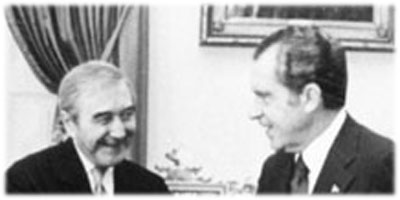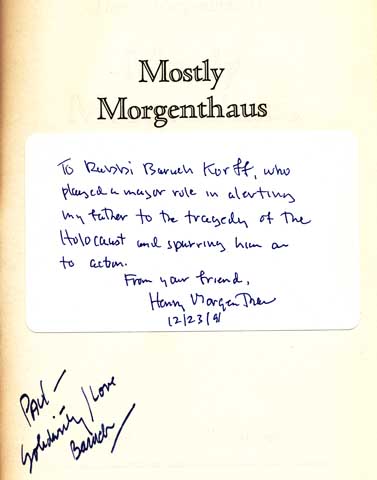
| RABBI BARUCH KORFF |
|
Perhaps Baruch’s greatest contributions came during the Holocaust and the years afterward in his fight to rescue Jews and establish a Jewish state. In January 1944, Henry Morgenthau Jr., the Secretary of the Treasury , convinced President Franklin D. Roosevelt to set up the War Refugee Board (WRB), an agency whose purpose was to rescue victims of Nazi oppression in imminent danger of death. The Secretaries of State, Treasury, and War served as the Board’s nominal members, and Baruch, through his connection to Congressman McCormack, became one of the agency’s consultants.
Although the WRB worked with Jewish relief organizations, diplomats in neutral countries, and resistance groups in Nazi-occupied Europe, it was able to save only 200,000 people. The only significant rescue program that it launched was a relief effort spearheaded by Swedish Diplomat, Raoul Wallenberg, in Budapest, Hungary. Wallenberg distributed tens of thousands of Swedish passports to Hungarian Jews, which in effect made these Jews citizens of Sweden and gave them the protection of Swedish neutrality in the war.[1][2]
The blame for the WRB’s failure to save more lives lies with its late start, lack of resources, and conflicts among the different U.S. government agencies on the board. In fact one of the reasons the War Refugee Board was formed in the first place was due to the State Department’s failure to even report the true nature of the Holocaust to the American people. According to John Pehle, a lawyer in the Treasury Department:
“We were advised by our friends in the State Department that the State Department not only was not interested in the refugee problem, but that they were actively suppressing information about the extent of the Holocaust by sending instructions to their legation in Switzerland not to permit private Jewish agencies to transmit any such stories.
“This suppression and cover up were the final straws…We prepared a memorandum, prepared by Joe DuBois and Randolph Paul and myself [all three were Treasury department lawyers] to Secretary Morgenthau, recommending that he go to the President and that an agency be established outside the State Department to handle the refugee policy of the United States.
“The suppressing of the information was the key to action being taken on behalf of the refugees. If you don’t know what is going on, and you suppress the information, the government becomes an accomplice to what the Nazis were doing, by hiding the information from the American public…
“In drafting the Executive Order [to set up the War Refugee Board], we tried to be inclusive of all the people that were under stress and fear of life because of the Germans. We not only were anxious to help people escape from the Germans, but we were urging other countries to take refugees in. And we felt that unless we did something ourselves in the United States, it was a pretty hollow thing.
“So we proposed to bring some refugees outside the quota and we finally got permission to do this. And we put them in an Army Camp in Oswego, New York…
“Looking back at the Board, I recognized that it was too late when it was established and the resources available were to small to deal effectively with the problem. But we were able to change the policy of the Unites States and we were able to help private agencies…”[3]
Read how Baruch Korff was
instrumental in getting the American government
to create a safe haven for refugees in
Oswego, New York.
Although Baruch Korff had not been privy to the background of the War Refugee Board’s formation, he quickly realized that the State Department was blocking many efforts to rescue refugees:
“I soon became aware of the jealousy and rivalry between Departmental officials and employees, particularly between those of State and Treasury. Since the Board, administered almost exclusively by Treasury personnel, was quartered at the Treasury building, the State Department invariably stalemated crucial steps.
“However…I had come to realize that it was not all rivalry—that prejudice had something to do with the stagnation. Mr. Breckenridge Long, then Assistant Secretary of State in charge of its Special Division, had fought the creation of the Board in stilted accents before the House Foreign Affairs Committee. He claimed that his Special Division ‘looks after such matters as the Jews.’ Because all the Board’s communications were channeled through the Department of State, Mr. Long was in key position to impair its program, and he did. He would either revise messages to a point of ineffectiveness, or he would, and frequently did, ‘misplace’ them.
“Mr. Long was not alone. The roster included Adolf A. Berle, Jr., then Assistant Secretary; James Dunn, later elevated to the post of Assistant Secretary; Paul Culbertson, then Chief of the Western Europe Division; and officials of lesser rank.”[4]
In his book, Mostly Morgenthaus, Henry Morgenthau III (the son of Treasury Secretary Henry Morgenthau, Jr.) writes about one of Baruch’s attempts to save Jewish lives:
|
|
 |
|
Henry Morgenthau III inscribed a copy of his book to Baruch, which left no doubt to the important role played by Baruch in the struggle to save Jewish lives during the Holocaust. |
|
“…three rabbis…called on Secretary Morgenthau on April 6, 1944, to plead for the lives of 238 very pious Jews (not primarily rabbis) who had been sent from Poland to a specially privileged detention camp outside Vittel, France. These Jews were protected by ‘bogus’ passports purchased from Latin-American officials. The Germans had chosen to recognize them as valid, with the intention of trading Jewish detainees for interned Germans.
“Then suddenly a group of Orthodox rabbis in the United States, Vaad Hahatzala (Rabbis’ Rescue Committee), learned that these passports were going to be invalidated. [This meant that the 238 Jews] would be immediately transported to a Nazi death camp. The rabbis realized the extreme need to get the U.S. State Department to bring pressure through the Swiss government to have the Germans reinstate these passports.
“This was the basis of the very emotional meeting in the office between Secretary Morgenthau and the rabbis. Rabbi Abraham Kalmonowitz (born in Belorussia)…used his broken English to serve as spokesman for the group. Rabbi Aaron Kotler, head of Vaad Hahatzala, spoke no English. The guide and wily expediter for the group was Rabbi Baruch Korff. At a very early age Rabbi Korff had gained the ear and confidence of many prominent American politicians, winning special access to Congressman John McCormack of Massachusetts (then House majority leader, later Speaker) and Senator James M. Mead of New York (the best man at Korff’s wedding).” [5]
According to Baruch:
“Throughout the late afternoon, Morgenthau attempted to reach [Secretary of State] Cordell Hull by telephone. He was told that Secretary Hull was tied up preparing an address scheduled for radio delivery.”[6]
Finally at the end of the day, Morgenthau learned that Hull had left for the weekend. Morgenthau then tried to reach the undersecretary of State and other State Department officials lower down, but was unsuccessful. So, without consulting Morgenthau, Josiah E. DuBois, one of the three Treasury Department lawyers who had urged Morgenthau to form the War Refugee Board, leaked the story to Drew Pearson, a popular radio commentator. Pearson made the plight of the 238 Jews one of his featured stories on his Sunday night broadcast. Early the next day, Secretary Hull called Morgenthau and told him that the State Department had decided to recognize the passports. But it was too late, the Jews had already been deported to Auschwitz Concentration Camp and murdered.[7]
Baruch also leaked the story to Pearson. According to Morgenthau:
“Rabbi Korff…reconstructed an account on how he was roundly chastised by an infuriated Secretary Hull for being responsible for ‘the lies on the radio…by that chronic liar.’ This account based on his memory is indirectly substantiated by an entry in the Morgenthau diaries, which indicates that Morgenthau asked his press secretary…to track down the leak. [The aide] reported that it had probably come from ‘the Rabbis’ or from Congressman McCormack or Senator Mead. However, since Pearson was sympathetic to the plight of the Jews and his broadcast was a primary Sunday evening event, it is entirely possible the both Korff and DuBois, each unbeknownst to the other, approached him independently.” [8]
Baruch’s mission to save as many Jewish lives as possible, lead him into negotiations with Heinrich Himmler, Adolf Hitler’s second in command.
“Although trading with the enemy in war time is a grave offense, I nevertheless dealt with the arch-executioner, Heinrich Himmler. The commodity was man’s biggest quarry—man. I bribed the apostle of death and the price was nine hundred and thirty seven thousand dollars. My agent in the transaction was Jean Marie Musy, former Federal Counsellor of the Swiss National Confederation…Musy arrived at an agreement with Hitler’s second in command, whereby Jews would be ransomed at twenty-six dollars a head.”[9]
“A convoy of 1,200 Jewish refugees from the Theresienstadt concentration camp in Austria [should be Czechoslovakia] arrived at Kreuzlingen [a Swiss city] today following negotiations by Jean Marie Musy, former Swiss Federal Councilor, with Heinrich Himmler. M. Musy…represented the executive council of the Union of Orthodox Rabbis of the United States.”
“According to Rabbi Korff, these Jews were released in return for a packet of diamonds given to Musy as collateral without the knowledge of the American government, which had not permitted money to be sent to Switzerland for this purpose. In the end all funds were used to purchase Jews from death with total disregard for U.S. provisions. Morgenthau knew it and told Rabbi Korff, winking, Let the bureaucrats have their day and you do what’s best.”[10]
After World War II ended, Baruch pushed for the formation of a Jewish state, creating the Political Action Committee for Palestine in 1946, and a year later, taking a more radical approach.
[1] “War Refugee Board, Rescue
Operations in 1944,” U.S. Holocaust Memorial Museum, website
http://www.ushmm.org/outreach/wboarchr.htm. Downloaded 8 September 2004.
[2] On a personal note: Two of
the Jews who received Swedish passports from Raoul Wallenberg were my
grandfather’s first cousin Johanna Rosenberger Spiegel and her daughter,
Regina Spiegel. [Carole G. Vogel, editor of the Paul Gass Family website.]
[3]
PBS website for The American Experience: “John Pehle
on Establishing the War Refugee Board”
http://www.pbs.org/wgbh/amex/holocaust/filmmore/reference/interview/pehle02.html.
[4] Flight from Fear,
p. 42.
[5] Morgenthau, Henry, III,
Mostly Morgenthaus (New York: Ticknor & Fields, 1991) pp. 328-329.
[6] Flight from Fear,
p. 45.
[7] Mostly Morgenthaus,
p.323, 328-330.
[8] Ibid.,
p. 330.
[9] Flight from Fear,
pp 79-81.
[10]
“First Jewish Convoy Reaches Swiss Haven,” New York Times
(8 Feb 1945). Reprinted in the Catalogue of an Exhibition of the
Rabbi Baruch Korff Archives, p.73